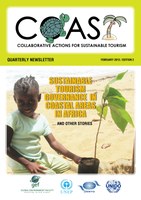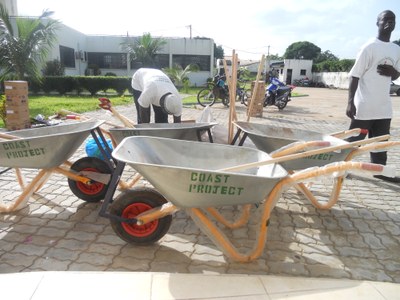Gambia: Coast Project Calls for Responsible Tourism, Protection of Coastal Environment
 The coordinator of the Collaborative Action for Sustainable Tourism (COAST) project has said that the goal of the project is to support and enhance the conservation of globally significant coastal and marine ecosystems and associated biodiversity in sub-Saharan Africa, through the reduction of the negative environmental impact, which they receive as a result of coastal tourism.
The coordinator of the Collaborative Action for Sustainable Tourism (COAST) project has said that the goal of the project is to support and enhance the conservation of globally significant coastal and marine ecosystems and associated biodiversity in sub-Saharan Africa, through the reduction of the negative environmental impact, which they receive as a result of coastal tourism.
Speaking in an exclusive interview with the Daily Observer, the project coordinator, Abubacarr Kujabi, disclosed that the ultimate objective of the COAST project is to demonstrate best practices & strategies to reduce the degradation of marine and coastal environments , and to enhance sustainable tourism practices and approaches for sustainable tourismin Africa.
The project, which was launched in Kartong village as one of the demonstration sites on 15th December 2012, is being implemented by the National Environment Agency (NEA) in collaboration with the Gambia Tourism Board. The objective is to "demonstrate and support the adoption of best practice approaches for sustainable tourism that reduces the degradation of marine and coastal environments of trans-boundary significance".
According to Kujabi, who doubles as the Programme Assistant for Coastal Zone Management Unit (CZMU) at the NEA, the project will provide cross-learning lessons on how to sustain the emerging and dynamic tourism sector in Africa. He said it also safeguards the fragile coastal ecosystems within the context of rapidly changing environments and increased international tourism.
He continued: "The project is expected to implement the following activities in Kartong within the lifespan of the project: Promotion of village tours, introducing camping, demonstrations of Gambian home cooking, bicycle hiring, cross-village excursions, promoting/developing craft, introduction of sports tourism, training and awareness raising on sustainable environment management, production of maps of the demo site and public private partnership planning."
Kujabi revealed that under the project, Kartong's ancient sacred site Folonko crocodile pool will be rehabilitated. "To introduce more environmentally-friendly activities, the project already bought and handed over 20 wheel-waste bins and 10 bicycles to Kartong Association for Responsible Tourism (KART)," he added.
He further revealed that the project will organise a one-day triathlon (run, bike and regatta style rowing competition on the Allahein Bolong) during the Kartong Annual Cultural Festival.The purpose, he said, is to enhance the capacity of stakeholders within the project area. Kujabi added that the project recently conducted a three-day cross learning training on Responsible Tourism and environmental management held in Kartong.
 He further disclosed that the project will also train 20 members of the community on environmental protection and management issues to enable them to protect the marine and coastal ecosystems. "In addition to a Training of Trainers (TOT) for six KART and VDC members to build capacity within the community for further replications, the project would also develop Tesito Camp into a camping site with modern facilities and enhance the Sandele craft showcase by introducing new craft products, among a long list of benefiting programmes and activities KART and VDC will benefit," Kujabi added.
He further disclosed that the project will also train 20 members of the community on environmental protection and management issues to enable them to protect the marine and coastal ecosystems. "In addition to a Training of Trainers (TOT) for six KART and VDC members to build capacity within the community for further replications, the project would also develop Tesito Camp into a camping site with modern facilities and enhance the Sandele craft showcase by introducing new craft products, among a long list of benefiting programmes and activities KART and VDC will benefit," Kujabi added.
He thanked the community for taking ownership of the project, which according to him, is a testimony that the project will be sustainable. He further urged the villagers to synergise tourism and tradition as there are lots of untapped opportunities that the village can harness to enhance responsible tourism while at the same improving their livelihood.
The COAST Project is a UNEP implemented, Global Environmental Facility (GEF) supported project that is executed by UNIDO in collaboration with UNWTO (UN World Tourism Organization). The COAST project also promotes rights of indigenous people by identifying community needs and gaps through community visioning exercise particularly regarding ecotourism developments and subsistence resource uses in protected areas in its three demo sites in Kartong, Tumani Tenda and Denton Bridge.
Countries involved in the project are: Cameroon, Ghana, Nigeria, Senegal, Kenya, Tanzania, Mozambique, Seychelles and The Gambia.



















